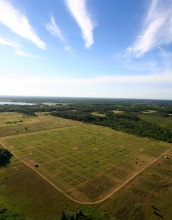Media Advisory 07-007
Society and Ecological Change Is Topic of National Science Foundation Forum
Sustainability of Earth's ecosystems highlight of sixth annual symposium on long-term ecological research

Sustainability of Earth's ecosystems highlights sixth Long-Term Ecological Research symposium.
February 28, 2007
This material is available primarily for archival purposes. Telephone numbers or other contact information may be out of date; please see current contact information at media contacts.
On Thursday, March 8, 2007, the National Science Foundation (NSF) will hold its sixth annual mini-symposium on Long-Term Ecological Research (LTER). This year's forum focuses on understanding the interactions between society and ecological change, and how they are linked to sustainability of Earth's ecosystems.
The symposium will feature talks on wildfires in Alaska's boreal forests; landscape changes in the northeastern United States over time; ecosystems in urban regions like Baltimore; and interactions between humans and the marine environment. A highlight of the symposium will be a presentation on the bioeconomics of biofuels and how grassland restoration is linked to renewable energy.
The LTER network comprises 26 field sites located primarily in the United States, but with a geographic span from the Arctic and Antarctic to the tropics. The sites represent Earth's major ecosystems, and include deserts, grasslands, forests, tundra, urban areas, agricultural systems, freshwater lakes, coastal estuaries and salt marshes, coral reefs and coastal ocean zones.
Who: James Collins, NSF Assistant Director for Biological Sciences
Henry Gholz, NSF Program Director for Long-Term Ecological Research
LTER Scientists (please see link to detailed agenda)
What: Mini-symposium on results of Long-Term Ecological Research
When: Thursday, March 8, 2007, 8:30 a.m. to 12:00 p.m.
Where: National Science Foundation
4201 Wilson Blvd.
Room 110
Arlington, VA 22230
-NSF-
Media Contacts
Cheryl Dybas, NSF, (703) 292-7734, email: cdybas@nsf.gov
Related Websites
Agenda, Sixth Annual NSF LTER Mini-Symposium: http://www.nsf.gov/events/event_summ.jsp?cntn_id=108416
NSF LTER Network: http://www.lternet.edu
The U.S. National Science Foundation propels the nation forward by advancing fundamental research in all fields of science and engineering. NSF supports research and people by providing facilities, instruments and funding to support their ingenuity and sustain the U.S. as a global leader in research and innovation. With a fiscal year 2023 budget of $9.5 billion, NSF funds reach all 50 states through grants to nearly 2,000 colleges, universities and institutions. Each year, NSF receives more than 40,000 competitive proposals and makes about 11,000 new awards. Those awards include support for cooperative research with industry, Arctic and Antarctic research and operations, and U.S. participation in international scientific efforts.
Connect with us online
NSF website: nsf.gov
NSF News: nsf.gov/news
For News Media: nsf.gov/news/newsroom
Statistics: nsf.gov/statistics/
Awards database: nsf.gov/awardsearch/
Follow us on social
Twitter: twitter.com/NSF
Facebook: facebook.com/US.NSF
Instagram: instagram.com/nsfgov


